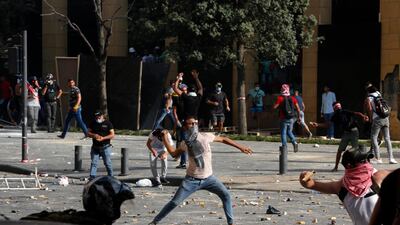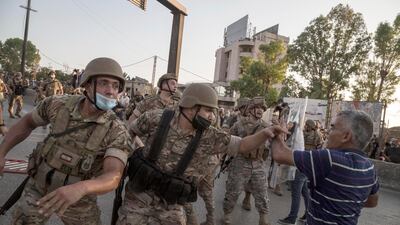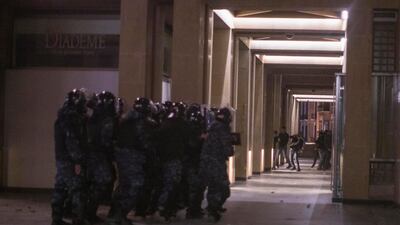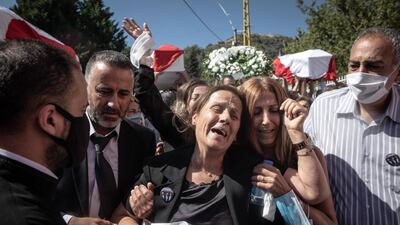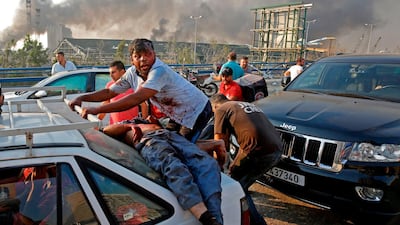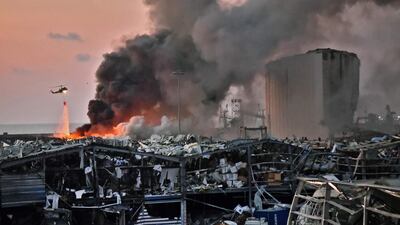Five months after a massive explosion ripped through Lebanon's capital and brought down its government, the country remains without a fully functioning Cabinet. Without it, negotiations over much-needed international financial aid to help the tiny Mediterranean nation recover from its worst economic and financial crisis in decades, remain in limbo.
Caretaker Prime Minister Hassan Diab, whose Cabinet has been heavily criticised for failing to contain the crisis that unravelled a year ago, met separately on Tuesday with the country's top three officials in a bid to break the deadlock over forming a government.
But his efforts have so far failed to yield tangible results, sources familiar with the talks told The National, with President Michel Aoun and Prime Minister-designate Saad Hariri having yet to agree on a meeting to resume stalled negotiations.
Mr Aoun and Mr Hariri's relationship has recently suffered setbacks after a video emerged last week of the president accusing the prime minister-designate of “lying”, after he was asked by Mr Diab about progress in the Cabinet formation talks during a meeting at the presidential palace.
On Tuesday, Mr Diab said he believed the president and prime minister-designate will meet soon to resume negotiations but stopped short of announcing a date.
"I think there will be a meeting soon between President Aoun and Prime Minister Hariri at a date they find appropriate in order to follow up on the issue [forming a Cabinet] and reach a solution that gives birth to a government as soon as possible," Mr Diab said, following his meeting with Mr Aoun.
The formation of a Cabinet committed to implementing anti-corruption reforms and putting the country's finances in order has been at the core of demands by the international community in exchange for providing financial support to help Lebanon weather its crisis.
The crisis, which began to unravel in the last quarter of 2019 amid a liquidity crunch that eventually led banks to enforce unofficial capital controls, fuelled nationwide protests that forced Mr Hariri's resignation and paved the way for Mr Diab to take office.
For months following its formation, Mr Diab's government drew sharp criticism from Mr Hariri's Future Movement over its crisis management plans. But the relationship took a turn for the better after Mr Diab was charged late last year with negligence in connection with the deadly Beirut port blast that killed 200 people, injured thousands and destroyed large parts of the capital in August.
Mr Hariri called the indictment an “attack” on the post of premier, a position reserved for Sunni Muslims under Lebanon's power-sharing system.
“Throughout the past period, I have shown openness and willingness...so that we can form a government. My position is clear in this regard and I thank the [caretaker] prime minister for his efforts in this regard," Mr Hariri said following his meeting with Mr Diab.
Mr Hariri's relationship with Mr Aoun deteriorated after the prime minister-designate put forward a Cabinet lineup of 18 "non-partisan" experts that failed to secure the approval of the president. Mr Aoun contested Mr Hariri's allocation of key portfolios among political groups to be represented in the government.
Mr Aoun's son-in-law and leader of the largest parliamentary bloc, Gebran Bassil, later accused Mr Hariri of denying the president the right to nominate Christian ministers. Mr Bassil said Hariri however reached out to the country's other major political groups to discuss the Cabinet makeup, including the Iranian-backed armed group Hezbollah.
Mr Bassil, a staunch ally of Hezbollah, which the US classifies as a terrorist organisation, was the target of recent corruption-related sanctions against the backdrop of a wide-ranging US campaign to pile pressure on Iran and its regional allies.
Many hope the end of Donald Trump's tenure as US president, which was marked by relentless efforts to curb the wide influence that Iran enjoys across the region, including Lebanon where Hezbollah and its allies hold a parliamentary majority, will pave the way for a potential breakthrough.
UN Special Coordinator for Lebanon Jan Kubis, who was recently appointed as Special Envoy to Libya, asked in a twitter post on Tuesday if the new administration in Washington will "finally move parties to create a new government led by PM Saad Hariri?"
“A new government doesn't automatically mean the end of the crisis,” Mr Kubis, added, warning that “no government just contributes to deepening of the collapse and suffering of the people”.
Lebanon's deepening crisis has seen the national currency lose over 80 per cent of its market value against the dollar so far and is threatening to plunge over half of the population into poverty, barring any reforms to revive the economy and fight corruption, the World Bank cautioned.
Among the key reforms demanded by the international community is a stalled forensic audit of the Central Bank, whose operations have been long shrouded in secrecy.
Swiss authorities confirmed on Tuesday that they have requested mutual legal assistance from Lebanon in relation to a probe into “aggravated money laundering” tied to the central bank.








